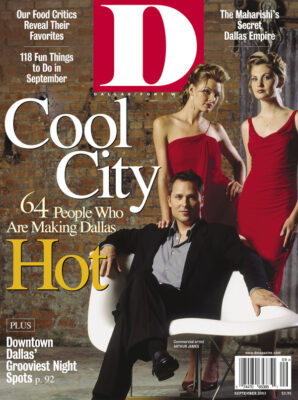While others fight to get bigger, the community newspaper will always be small. That’s why I bought People Newspapers.
IN 1981, TWO YOUNG MEN NAMED REID Slaughter and Kirk Dooley dropped by the magazine’s office to talk about an idea. They told me they wanted to start a weekly newspaper—a real newspaper—to serve the Park Cities. They pointed out that these are communities with their own town halls, their own police, and their own schools. There were stories going untold, news about neighbors that people didn’t know, information that could be helpful. They thought a newspaper would fill the need.
I know most people think of the Park Cities as tony enclaves of the rich and social. But most of the people who live there don’t think of them that way. To most of those folks, the Park Cities are small towns with their own small-town quirks and characters. In that way, they are the same as Duncanville or DeSoto or Wylie. So the idea made sense to me, and I told them I thought it would work.
Last month, it was my honor to become the majority owner of Park Cities People and its cousin, Northside People. It was an honor because both have become outstanding examples of the art of community newspapering. And it was an honor because that’s my neighborhood, where I grew up and where I went to school.
In buying the newspapers, I realized perfectly well that I was bucking a trend. The buzzword in media these days is consolidation. The idea of the independent newspaper is fading rapidly into the past. How rapidly? Ten companies now control more than half of the nation’s daily newspaper circulation.
The trend is everywhere. In radio, Clear Channel in San Antonio broadcasts in 248 of the top 250 radio markets, controlling 60 percent of all rock programming. Four companies, including Clear Channel, now control 63 percent of the Top 40 stations nationwide and 56 percent of country music stations nationwide.
Unless overruled by Republicans in Congress, the FCC’s recent ruling on media consolidation will only make things worse. In Dallas, the Kidd Kraddick show on KISS-FM 106.1 only two years ago was a daily fount of talk and information about the city. Clear Channel now airs Kraddick’s program in several markets, which means the morning crew can no longer chitchat about things that matter to its listeners here. More numbers mean blander content. That’s the push everywhere in media: gain mass audience; operate more efficiently; make the quarterly numbers for Wall Street; and, in the process, dumb down the content.
In a prescient article 20 years ago, techno-prophet George Gilder predicted that the TV networks, desperate to hold on to dwindling audiences in the face of competition from cable and satellite, would turn more and more to sex. Then, he said, as audiences declined even more, the sex would get more and more vulgar. Watched any primetime television lately? It is a spiral that can only point downward.
Meanwhile, the daily metropolitan newspaper faces a triple threat. I’m not singling out the Morning News, because the same factors are hitting all major city newspapers. Three national newspapers, the New York Times, USA Today, and the Financial Times have joined the Wall Street Journal in aggressive marketing to local markets. The New York Times may only have 10,000 subscribers in Dallas, but those 10,000 are among the crème de la crème of newspaper readership, and many of them have dropped the News. Like most other Dallasites, those readers get their local city news from television. At the same time, the metro newspapers’ once-dominant advertising positions are under attack from the Internet, especially its once-unassailable bulwark of classified ads, which is a metro’s bread and butter. But why would anyone run a classified to buy or sell when eBay is at his fingertips?
In the midst of all this mayhem, the community newspaper quietly goes about its business: weddings, obits, police reports, births, houses for sale, cats to adopt, the everyday business of life in a place where people walk their dogs and bicycle with their children and grill in the backyard.
In that way, the community newspaper occupies a distinct role in American life. While others fight to get bigger, the community newspaper will always be little. It is the champion of the little things. It is about neighbors and neighborliness, about street fairs and school lunches and high school sports. It is about the Fourth of July parade and the homecoming queen. It’s a weekly reminder of why our neighborhoods are special and what we can do to keep them that way. Its job is to make you feel at home in the place you call home.
I bought the newspapers because I believe everybody else is wrong and that Reid and Kirk were right. Small is good. Local is better. And what we do here, right now, in our neighborhoods and churches and associations, with each other, can change our city. And by changing our city, we can change the world.





